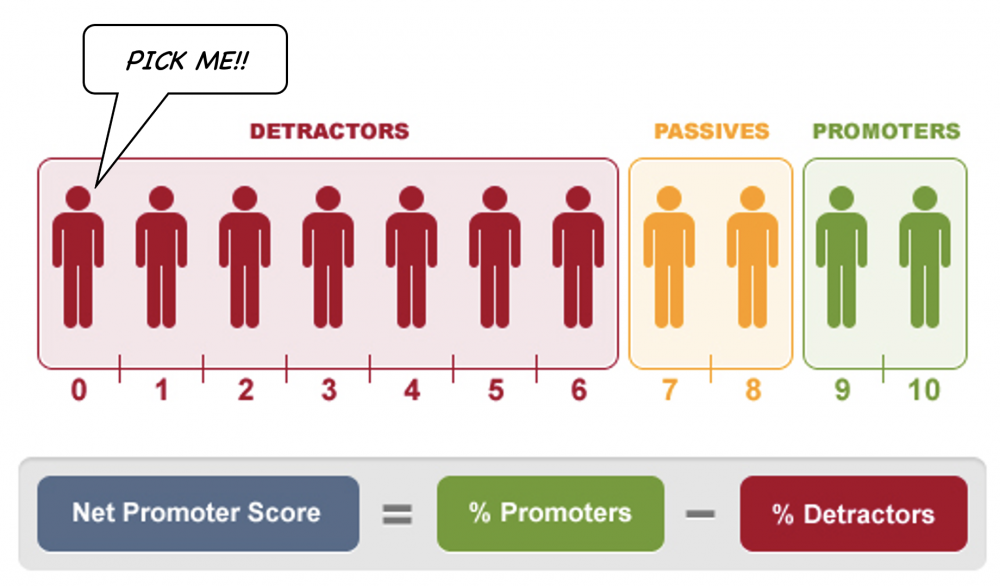Net promoter score: Difference between revisions
Amwelladmin (talk | contribs) No edit summary |
Amwelladmin (talk | contribs) No edit summary |
||
| Line 1: | Line 1: | ||
{{a|devil| | {{a|devil| | ||
{{image|Net Promoter Score|png|How to vote if you find NPS questionnaires tiring.}} | |||
}}Usually taking the form of a survey question along the lines “on a scale of 1-10, [[how likely are you to recommend us to a friend or colleague?]]” the [[net promoter score]] is a device, recognised by [[those who know]], to measure meaningful client loyalty, the likelihood of client referrals, recommendations, and the potential for repeat business. The aggregate data spinning off an “NPS” question is considered, by [[those who know]], as a good [[proxy]] for forecasting business grown and the health of one’s brand. | }}Usually taking the form of a survey question along the lines “on a scale of 1-10, [[how likely are you to recommend us to a friend or colleague?]]” the [[net promoter score]] is a device, recognised by [[those who know]], to measure meaningful client loyalty, the likelihood of client referrals, recommendations, and the potential for repeat business. The aggregate data spinning off an “NPS” question is considered, by [[those who know]], as a good [[proxy]] for forecasting business grown and the health of one’s brand. | ||
Revision as of 14:32, 22 September 2022
|
|
Usually taking the form of a survey question along the lines “on a scale of 1-10, how likely are you to recommend us to a friend or colleague?” the net promoter score is a device, recognised by those who know, to measure meaningful client loyalty, the likelihood of client referrals, recommendations, and the potential for repeat business. The aggregate data spinning off an “NPS” question is considered, by those who know, as a good proxy for forecasting business grown and the health of one’s brand.
These we are inundated with “NPS” questionnaires for anything from yeast extract to the London Underground. They are at best a second-order derivative and in most cases just a lazy proxy for what they purport to measure. To see that this is so, ask yourself: how seriously do you take the net-promoter questionnaires that flood your inbox every day? Have you, really, ever recommended yeast extract to your friends and family? How about your internet service provider?
Net promoter methodology is leeching away from the brand value of chocolate bars and is seeping into the management methodology of international financial institutions — weird — and, weirder still, to the performance measurement of their internal functions. Now we of the western liberal elite are surely messed-up, readers, but not so divorced from reality that any of us would honestly recommend to our loved ones our employer’s IT help or HR self-service portal. Or our asset manager, insurance company, debt collection agency, broker-dealer or any of the other modernists behemoths that perpetrate their its worst reasonable efforts on a systematic basis.
That these organisations even ask whether their customers would recommend them suggests some kind of survivor bias among respondents: there can be no other explanation than “only the truly sycophantic and ingratiating even answer these Net Promoter Score questionnaires”.
It is hard to credit that information given under protest but still for free at the end of meaningless encounter with customer support can, when aggregated, tell the firm anything about how its customers regard it — surprise surprise, the theory behind the NPS questionnaire is based on pure, dumb correlation — and since the arithmetic behind the NPS calculation is elementary, there is a simple way to banish them from the common currency: consistently vote them down. It is not a question of whether you recommend your favourite epoxy resin to your friends and family — why do you care whether they know that or not? — but whether you want to be bombarded with these stupid questionnaires. The simple answer is to vote no.
